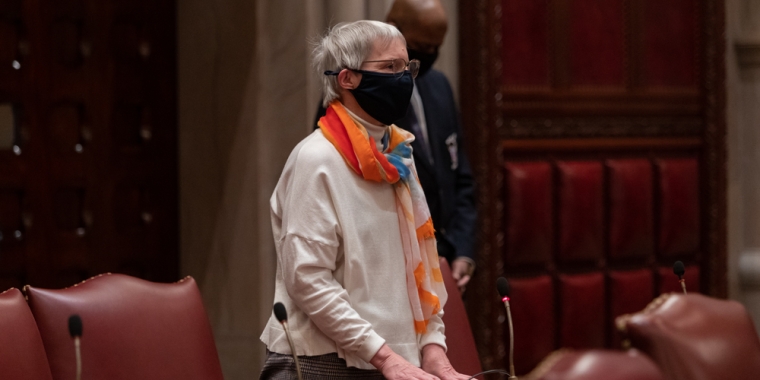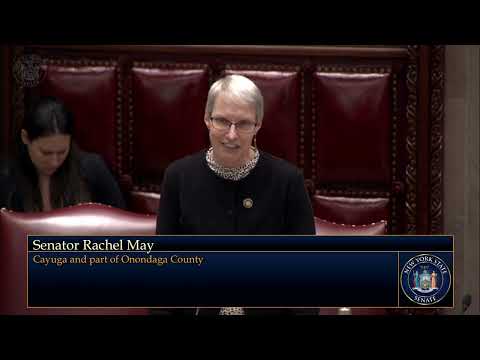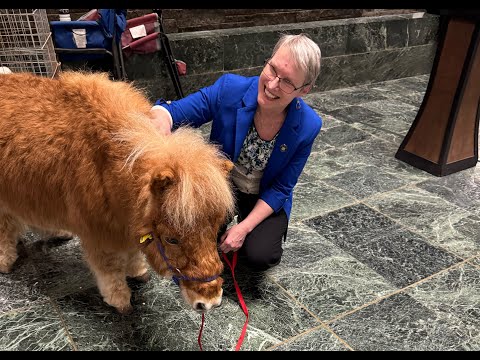Senator May Champions Legislation to Address Nursing Home Visitation and Improve Long-term Care
February 9, 2021
-
COMMITTEE:
- Aging

Syracuse, NY - Today, Senator Rachel May (D-Onondaga, Madison, Oneida) advanced three pieces of legislation through committee that will address the dire circumstances witnessed in nursing homes during the COVID pandemic.
The bills are:
- S.614A -- The “personal and compassionate caregiving visitation bill” which will allow specially designated visitors at nursing homes and residential healthcare facilities
- S.612A -- Enacts the "long-term care ombudsman program reform act"
- S.598A -- Enacts the "reimagining long-term care task force" to create a task force to study the state of long-term care services in this state
The Senate Health Committee advanced the Personal and Compassionate Caregiving Visitation bill to the floor of the Senate, where it will be voted on in coming weeks. The bill authorizes and directs the New York State Department of Health to develop rules, regulations, and guidelines authorizing and regulating visitation under certain circumstances while general visitation continues to be restricted by the pandemic. The bill will create exemptions for personal caregiving visitation, in which a designated family member or other individual who has provided essential care and support with daily tasks such as eating, dressing or bathing can continue to do so. The compassionate caregiving provision will allow for a visitation exemption not just for end-of-life circumstances, as currently interpreted by facilities, but also in cases where a resident suffers from significant changes in mental or psychosocial wellbeing as a result of isolation or other factors. Currently, Department of Health guidelines require a nursing home or adult care facility to be COVID-19 free for 14 days before they can allow family members to visit.
“I hear daily from distraught family members, constituents, and advocates about the toll the visitation ban in nursing homes is taking on their loved ones,” said Senator May. “During the recent hearings, we heard over and over how families continue to be blocked from visiting due to the Department of Health’s stringent rules. For many residents it has become a life or death issue. My bill creates the opportunity to reopen visitation while ensuring top safety standards, so that family members can be reunited and residents can get the care and attention they need.”
The Senate Aging Committee advanced the Long-term Care Ombudsman Program Reform Act. This bill would enhance the Long Term Care Ombudsman Program (LTCOP), supporting the volunteers who serve as advocates for residents in long-term care facilities and their families. It will increase visibility of the program, strengthen communication with DoH, and generally raise the profile of this important resource.
The Senate Aging Committee also advanced a bill to create the Reimagining Long-term Care Task Force. The Task Force will bring experts together from a wide range of areas of expertise to propose solutions to the systemic deficiencies in long-term care and to the problems that arose in the context of the pandemic. Members would include care workers, industry and state agency professionals, advocates, and those with expertise in a wide range of relevant areas, including elder law, senior housing, and racial disparities in long-term care. The Task Force will report the findings of its study by December 1, 2021, and follow that with a full report, including recommendations for further action and legislation, by May 2022.
“This devastating pandemic is a wake-up call for us to finally address systemic challenges that have plagued our elder care systems for too long,” says Senator May. “Staff shortages, caregivers forced to work multiple jobs to make a living wage, lax infection controls, chronic funding issues, lack of transparency and oversight -- these and other issues increased the vulnerability of older New Yorkers to this deadly virus, especially those living in nursing homes. We have a critical opportunity -- and a responsibility -- to rethink the whole system of long-term care in a way that truly prioritizes the needs of older New Yorkers and those who care for them.”
# # #
related legislation
Share this Article or Press Release
Newsroom
Go to Newsroom


